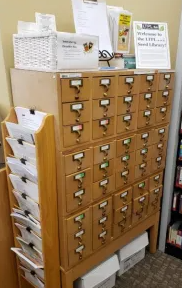|
|
And what is so rare as a day in June?
Then, if ever, come perfect days;
Then Heaven tries earth if it be in tune,
And over it softly her warm ear lays;
Whether we look, or whether we listen,
We hear life murmur, or see it glisten; Excerpt from "What is so Rare as a Day in June" by James Russel Lowell |
|
Freezing and Dehydrating are two methods of food preservation that don't require require a lot of specialized equipment. We don't always have a surplus of food to process at one time, and freezing is a great method for preserving both small batches or bushels of produce! If you have a dehydrator, that's great! We will discuss how to use it, but you can also accomplish your goals using other methods. There will be a question and answer period following the demonstration, and experienced preservers will have an opportunity to add to the conversation if they so desire. Everyone will leave with an informative handout. |
|
|
|
CanningIn-Person Monday, July 17, 2023 at 6:30pm Join us as we learn about preserving food by canning using the most up-to-date methods. We will discuss both pressure canning and water-bath canning and how to decide which method to use. Safety, equipment, and recipes will be discussed. There will be a question and answer period following the demonstration, and experienced preservers will have an opportunity to add to the conversation if they so desire. Everyone will leave with an informative handout. |
|
|
In-Person Monday, August 7, 2023 at 6:30 pm
Join Karen Golden and Pam Quackenbush to learn about preserving fruits and vegetables using the ancient method of fermentation. From sauerkraut to hot sauce, if you can grow it, you can probably ferment it! Observe hands-on demonstrations using different equipment and methods to create delightful ferments that are so good for your belly. There will be a question and answer period following the demonstration, and experienced fermenters will have an opportunity to add to the conversation if they so desire. Everyone will leave with an informative handout. |
It's June!
June is when seeds for warmth-loving crops like squash, melons, beans, and corn can safely go in the ground. The same goes for quick-growing annual herbs and flowers like basil, zinnias, cosmos, and sunflowers. Visit LTPL's freshly re-stocked seed library for a great selection of free seeds for these items and more. Click Here for a seed-starting timetable for our area. One Seed, One State: This year the MI Seed Library Network has chosen 'Grand Rapids' lettuce as the seed that will be distributed through seed libraries all over Michigan! Visit LTPL for your One Seed, One State seeds. |
 The mission of the seed library is to promote gardening and encourage sustainability through seed saving. The seeds are available at no cost to you. Although it is not required, we hope that you will attempt to save seeds from your crops and return them to the seed library to help keep it self-sustaining. First time users of the Seed Library need to register. You may do so with this form or in-person at the seed library. Once you have registered, you log your initials and number of packets taken on the clipboard. The clipboard and instructions are on top of the Seed Library cabinet. Gardening handouts are available at the Seed Library and also on the LTPL Grows Webpage, along with informative videos! |
|
|
In June: - In early June, finish planting your warm weather vegetables and flowers. Transplant your crops that love heat: Tomatoes, eggplants, peppers, sweet potato slips plus various herbs and flowers. Seeds for corn, beans, squash, melons, and cucumbers can be sown directly outdoors.
- Remove cool season crops as they bolt (form seed stalks). Additional plantings may be made of lettuce, spinach, radishes; they need some shade and cooler temperatures so planting them under taller crops will extend the harvest.
- Make sure to thin crops planted in April and May so the remaining plants will reach their full potential.
- Check frequently for weeds that will be taking resources from your garden plants. Pull them when young and compost them to return those resources to the soil.
- Monitor for insect and animal damage. Plastic owls might prove helpful in deterring groundhogs, squirrels, and rabbits. Be sure to move them about the garden so the animals don't catch on.
- When moving houseplants outdoors for the summer, make sure they are acclimated gradually and not put in direct sun.
- Visit the LTPL Seed library and check for seeds you might need.
- Information and online resources for starting and saving seed can be found on the LTPL website.
Click Here for a seed-starting timetable for our area
Find additional resources for seed saving here:
 |
Over 50 gorgeous recipes to make with vegetables, fruits, herbs, and flowers and how to grow them in your own garden! The book is filled with cultural advice and beautiful illustrations. |
|
|
Michigan Gardener Magazine will only be published once May 2023. The library has a good supply of this issue, so visit and get yours while they last. Visit the Michigan Gardener website for their newsletters, both past and present and browse through digital back issues of the print magazine. |
|
Find more information on LTPL Grows and other resources! |
Visit and "like" for gardening news, tips and upcoming events. |
|
|
|
|